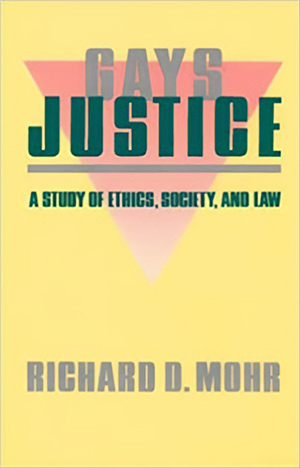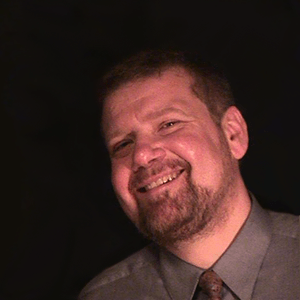© 1988 Rich Grzesiak, all rights reserved.

Professor Richard D. Mohr, Associate Professor in the Department of Philosophy at the University of Illinois-Urbana, has just written a humorous, angry, sobering and very potent book [Gays/Justice: A Study of Ethics, Society, and the Law; Columbia University Press, $30/hardcover] that takes the controversial position that gay rights are not just good for gays, but all Americans as well.
You would expect Mohr to be a real rabble rouser, considering his forthright opinions. He thinks the baths should remain open, that civil disobedience (sit-down protests and the like) should be the new gay political style. He writes that since the Supreme Court in 1986 declared gays have "no privacy rights," "gays should be having grave doubts that the rule of law applies to them." Shockingly, he's opposed to the very notion of Jesse Jackson's "rainbow coalition" and thinks it's a complete waste of time trying to win over the support of blacks, Hispanics and other minorities.
So when I interrogated him on the subjects of ethics, society, gays and the law, I expected a tiger anxious to thunder at my politically incorrect meandering. Instead, I found a thoughtful, brilliant man, capable of explaining his ideas in a charismatic manner that really communicated.
We had what Soviet diplomats call a "frank exchange of views" [by phone], and here's how it went:
Rich Grzesiak (RG): George Bush is our forty first President, a Presidency which will continue the power of judicial appointment at the national/federal level for the Republican Party and the philosophical stance which governs most of its appointments. What do you think his election will mean for the judicial climate for gay issues at the federal level?
Richard Mohr (RM): I think it looks very gloomy there, that we are basically going to lose everything. We may win a few small procedural decisions-last year we won a very small one with the Supreme Court-but as far as the substantive issues go, and the main one is whether gays are going to be afforded some enhanced equal protection rights against discrimination directed at their status as gays, I feel quite certain that we will lose that one. Between that issue and the privacy cases going down the tubes, then any sort of discrimination that's directed against gays will be OK in the constitution's eyes.
RG: I bought my monthly copy of Drummer magazine yesterday and noticed that its editor quit, allegedly due to his fear of the political backlash from the coming reintroduction of federal anti-obscenity laws.
RM: The anti-obscenity laws that just died last year in Congress, as far as I understand them, are racketeering type legislation directed at squelching discussions of and for sex by attacking bookstores rather than publishers. Bookstores will be very hesitant to carry things, which will have an indirect effect on publishing, of course. The legislation proposes that if two "obscene" items are found to be in a store, the government can close it down and take its assets even before a trial.
It will be very interesting to see how that flies in the courts. I believe there is a similar case from Indiana before the Supreme Court this year, and it's not clear how they will adjudicate it. This is an attempt by the right to try a new strategy that will not run into old, settled judicial precedent, expecting that they will win in these new areas. So here the offensive is: attack the bookstores and not the publishers. And they may well win that.
RG: Back to the Supreme Court: can gays change the philosophical stance of this court, other than by making moral points through demonstrations or letter writing campaigns? Are we pretty much stuck with the jurists we have?
RM: I'm not a Supreme Court insider, but it's quite clear letter writing campaigns have no effect at all on the justices, as most of them don't read their mail. Letter writing is a lost strategy as far as the court is concerned.
I suspect we'll see more non-ideological conservatives on the Court, people like Justices Kennedy and Powell. With people like that, gays will simply lose. They will be making decisions based on their experience which simply doesn't include gays.
Yes, I think the judiciary looks extremely bleak.
RG: What of the recent Presidential campaigns of Bush and Dukakis? How would you assess the role gay rights played in it?
RM: I think gays misunderstood the stakes in the election. When gay newspapers and our political organizations had their little charts comparing the Democratic and Republican platforms, they were really thinking small. I believe the issue should have been, namely, in a crisis, which candidate is more likely to sustain the rule of law?
At that level, the choice is not clear and Dukakis came out very poorly. Every time he was called upon to take a principled stand, every time a rights issue came up, instead of explaining and defending rights, he punted. That did not look very promising, and we must remember that the worst violations of rights in this country have in fact occurred under the Democratic watch: for example, the internment of the Japanese. So it's not clear to me who was the best candidate as far as the big issues concerning gays go.
RG: How would you evaluate the strength of the gay community? In my view, they seem like a pretty weak lot as very few gays are politically involved. If I were a non-gay politician, I don't think I would regard most gay leaders seriously because I don't believe they represent many committed people.

RM: I think the best shot for gay political leaders is not to count on large numbers but to rely on the few occasions in American history where ideas did matter, to make principled, reasoned arguments, to try to persuade legislators, most of whom are lawyers used to arguments, to rise above their constituents. It seems to me that's the best shot gay leaders have.
But that's not the strategy they're pursuing. They're taking the standard, old-fashioned, Write Your Letters to Your Congressmen, Politics As Usual approach. The track record there doesn't seem to be very good to me.
I think you're right, that the materials of a mass movement are not there for the Politics As Usual strategy to work. I think that's a wrong strategy and they should start talking up the politics of principle rather than a politics of mass movement.
RG: We just passed the tenth anniversary of Harvey Milk's death. We don't have any Harvey Milks in our movement today. Why?
RM: There's been a real professionalization of the gay movement, due largely as a result of the AIDS health crisis. You have professionals running gay organizations. Having your existence defined in terms of committee work basically destroys original thought. So you don't see gay politicians thinking about reasons and principles, all they think about is, well, what sort of consensus can we get here?
When those conditions exist, you can't get a Harvey Milk. I quote Milk at several points almost in saintly fashion. He said that we had to have strong leaders, we can't compromise; all that is lost on the current gay leadership.
RG: Hmmm, mmmm! How true and how depressing.
Randy Shilts has been urging gay leaders to cooperate with the closing of the baths as a health preservation measure. What strategy would you urge vis-a-vis the bath houses?
RM: Well, it's no longer much of a live issue, in fact, most of them have closed or been closed.
No, there are still some urban, metropolitan parts of the country where the bath houses remain open: Seattle, Philadelphia, other places.
Can bath houses be legitimately closed by the state? I think not. Closing the baths is unjustified, paternalistic legislation. Shilts' book [And the Band Played On ], in all six hundred pages, never draws a distinction between people harming themselves and people harming others. Since AIDS is something you get from what you do with others, it's really you who are harming yourself. Since I do not think that the function of government is to save people from themselves, I do not think it is a proper purpose of government to close the bath houses.
RG: You make some very strong points in Gays/Justice about civil disobedience and nonviolent action as a new strategy gays should pursue. Let's be realistic: I see 95% of gays as being uninvolved with anything more political than their Valentine's Day greeting card lists. Is it reasonable to urge nonviolence upon a mainly apolitical group?
RM: The extraordinary thing about gay civil disobedience is that it nudges far beyond its size. Very few blacks were arrested for civil disobedience in the South at lunch counters-a few hundred at most. As far as civil disobedience goes, the gay protest at the Supreme Court a while back was the largest such demonstration at the Court ever in the nation's history, probably the biggest since the Vietnam war era.
This kind of political activity has effects far beyond its size and represents something the gay community is capable of, even if 99% of gay people are self-oppressing closet cases.
RG: Do you think that one of the problems associated with gay activism today is the severe impact of AIDS on our community and the consequential diminution on political involvements?
RM: Unquestionably so. The AIDS crisis has been a black hole for gay energy; it has been absorbing enthusiasm entirely and in every way.
Besides tapping gay energies, AIDS is disguising them. When the Names Project was displayed in Washington last year, no people mentioned that most commemorated were gay and most of the drive behind the Project was gay. When people only talked about their sons and children who died of AIDS without mentioning lovers or the word "gay" at all, you realize that gay energy is just being dispersed and hidden.
So even as gay enthusiasm goes into the health crisis, it's erasing itself, too, quite aside from the fact that virtually nothing is being done on the civil rights front now.
RG: I was struck by your accusation in Gays/Justice claiming that "the New Right has learned more from the civil rights movement than gays have."
RM: Oh, yes! You shape your strategy with the least possible explicit mention of the group you trying to get. They're very clever that way.
Notice, for instance, that if you just talk about family and marriage, you can write all your discriminatory laws without mentioning gays at all These strategies employing phony, neutral principles are almost always upheld in the courts. Even if gays were given the same constitutional protections as blacks, policies that seem to have what in legal terms are called a dispersed impact, namely it affects gays more than it does other groups, those sorts of laws are upheld even in the case of blacks.
RG: When you write that "gays see injustice toward themselves more as 'harms than indignities,'" is that why you think they have been so apolitical? In other words, prejudice just hasn't hit home, and they regard homophobia more as an inconvenience instead of a limit on their political power?
RM: Gays don't see themselves as having enough dignity such that self-respect can be insulted. Here we have a case where self-oppression shapes the way in which people regard the gay civil rights movement and view it as merely an attempt to overcome inconveniences rather than setting up conditions under which individuals may flourish.
RG: A few months ago a non-gay colleague at work derided the very reality of anti-gay prejudice, mentioning the case of a well-known, gay, Olympic medal-winning athlete who's about to earn millions. How can there possibly be any discrimination?
RM: What should concern us here are issues of dignity. The person you mention may be wealthy, but insulted to his core. That's how somebody like the late Roy Cohn get so screwed up.
RG: I was pleased by your assertion that coalition building is not a wise game plan for gays. You make the argument that other minority groups have conflicting priorities, and don't necessarily want to battle for issues affecting gays. I would even take the position that some of these golden, rainbow colored minorities gays have been trying to ally with-blacks, Hispanics, etc.-are frequently just as homophobic, if not more so, than other segments of the population.
RM: If your assertion is correct, and I think it is, then it actually takes more work to get them on our team than it does to actually address the people with the power I find this a practical argument against coalition building.
RG: Are you also saying that gays should depend more on their own powers of persuasion and rhetoric-others can't win our battles for us?
RM: We are the only ones that have any sense of ourselves. Otherwise, you just get sympathy and pity, the mother talking about her son. You don't get any deep understanding there.
RG: Would you buy the argument that, to wield the largest coalition of gays for political purposes, we should focus solely on a narrow gay rights agenda to the exclusion of other, divisive issues, like, say, feminism or gay parenting issues?
RM: I think the problem is not that so much as our cause getting diluted or dissolved into other groups. That was quite clearly the case when people pinned their hopes on Jesse Jackson. While it is true that now and then he did mention gay issues, we were never really a very high priority with him. If you saw his literature, AIDS, for example, was essentially viewed as a threat to the black community.
RG: I'm not really big on the Reverend Jesse Jackson -- Andrew Jackson or the (Los Angeles based) KABC-AM radio talk show host Michael Jackson, maybe.
RM: The gay movement now needs to collect itself and that involves something not quite like separatism, but figuring out what we are on our own a separatist non-coalition stage is what's needed. By "separatism," I mean we need to get a sense of ourselves, not separating from society or the sort of thing lesbian-feminist separatists have in mind.
A final question: let's look ahead eight years from now: Vice President Dan Quayle has just been elected President, he opposes a federal gay civil rights bill, and the measure languishes in Congress, losing support. What would be your advice?
I have no killer answer for you other than back to the drawing boards. But in gay political terms, I would suggest that it's 1854, the year of the Dred Scott decision [which held that blacks were not U.S. citizens], and the Civil War is coming.
